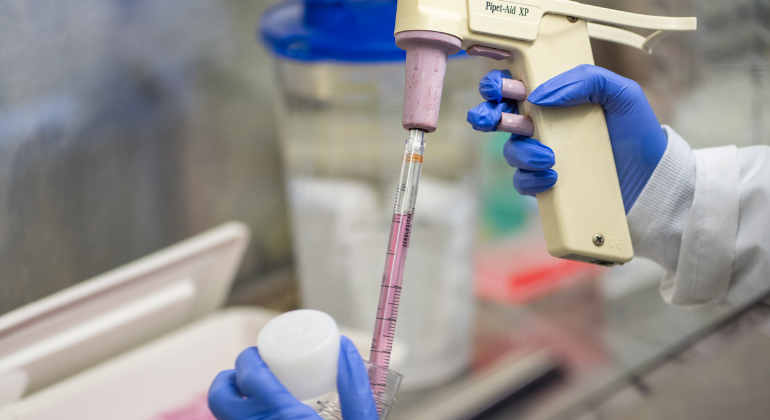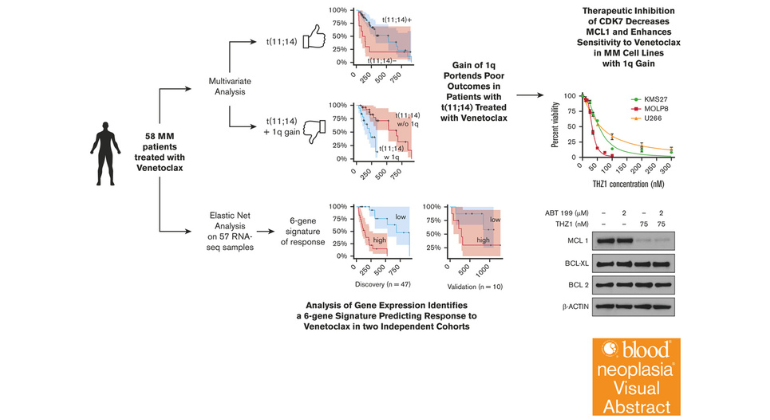Mount Sinai Study Reveals Why Some Myeloma Patients Stay Cancer-Free for Years After CAR T Therapy
New insights offer hope for longer-lasting remissions in people living with multiple myeloma

A new study from the Icahn School of Medicine at Mount Sinai helps explain why some people with multiple myeloma, a type of blood cancer, stay in remission for many years after receiving CAR T cell therapy, while others see their cancer return sooner.
Published in Blood Advances, the research is the first longitudinal, single-cell, multi-omic study of cilta-cel in multiple myeloma. Cilta-cel (ciltacabtagene autoleucel) is a type of CAR T cell therapy used to treat relapsed or refractory multiple myeloma. It works by using a patient's own T cells, which are genetically engineered in a lab to target and kill cancer cells that have B cell maturation antigen (BCMA) on their surface. The modified T cells are then infused back into the patient as a one-time treatment to fight the cancer.
This study reveals that long-term remission depends on a synergy between the infused CAR T cells and the patient’s own immune system, particularly the preservation of diverse T cells and the absence of suppressive myeloid cells.
“CAR T cell therapy has changed myeloma care, but not everyone maintains a long remission,” said Alessandro Lagana, PhD, Assistant Professor of Oncological Sciences at the Icahn School of Medicine at Mount Sinai and senior author of the study. “We wanted to understand what’s happening in the immune system of patients who stay in remission for more than five years after a single infusion.”
The Mount Sinai team followed 19 patients who received cilta-cel as part of the CARTITUDE-1 clinical trial and used advanced lab tests to study their blood and bone marrow samples before and after treatment.
The study identified several immune features linked to long-term remission. Patients who stayed cancer-free for more than five years showed an early, focused expansion of CAR T cells and a broad, diverse population of healthy helper (CD4) T cells that remained active over time. In contrast, patients who relapsed sooner had higher tumor burden at baseline and an early rise in immunosuppressive myeloid cells that can blunt T cell responses.
“This research shows that long remissions depend not only on the CAR T cells we give, but also on the patient’s own immune system,” Dr. Lagana said. He explained that understanding these immune patterns could help doctors choose the right patients for CAR T cell therapy, watch for early signs of relapse, and develop new treatments that keep the immune system strong and responsive.
The researchers plan to test their findings in larger studies and to create a simple blood test or biomarker panel that could predict which patients are most likely to stay in remission.
The study received funding from Mount Sinai’s Center of Excellence for Multiple Myeloma and included collaborations with Johnson & Johnson, which developed the CAR T cell therapy, and Immunai, which helped with data analysis.
About the Icahn School of Medicine at Mount Sinai
The Icahn School of Medicine at Mount Sinai is internationally renowned for its outstanding research, educational, and clinical care programs. It is the sole academic partner for the seven member hospitals* of the Mount Sinai Health System, one of the largest academic health systems in the United States, providing care to New York City’s large and diverse patient population.
The Icahn School of Medicine at Mount Sinai offers highly competitive MD, PhD, MD-PhD, and master’s degree programs, with enrollment of more than 1,200 students. It has the largest graduate medical education program in the country, with more than 2,700 clinical residents and fellows training throughout the Health System. Its Graduate School of Biomedical Sciences offers 13 degree-granting programs, conducts innovative basic and translational research, and trains more than 560 postdoctoral research fellows.
Ranked 11th nationwide in National Institutes of Health (NIH) funding, the Icahn School of Medicine at Mount Sinai is among the 99th percentile in research dollars per investigator according to the Association of American Medical Colleges. More than 4,500 scientists, educators, and clinicians work within and across dozens of academic departments and multidisciplinary institutes with an emphasis on translational research and therapeutics. Through Mount Sinai Innovation Partners (MSIP), the Health System facilitates the real-world application and commercialization of medical breakthroughs made at Mount Sinai.
-------------------------------------------------------
* Mount Sinai Health System member hospitals: The Mount Sinai Hospital; Mount Sinai Brooklyn; Mount Sinai Morningside; Mount Sinai Queens; Mount Sinai South Nassau; Mount Sinai West; and New York Eye and Ear Infirmary of Mount Sinai.
About the Mount Sinai Health System
Mount Sinai Health System is one of the largest academic medical systems in the New York metro area, with 48,000 employees working across seven hospitals, more than 400 outpatient practices, more than 600 research and clinical labs, a school of nursing, and a leading school of medicine and graduate education. Mount Sinai advances health for all people, everywhere, by taking on the most complex health care challenges of our time—discovering and applying new scientific learning and knowledge; developing safer, more effective treatments; educating the next generation of medical leaders and innovators; and supporting local communities by delivering high-quality care to all who need it.
Through the integration of its hospitals, labs, and schools, Mount Sinai offers comprehensive health care solutions from birth through geriatrics, leveraging innovative approaches such as artificial intelligence and informatics while keeping patients’ medical and emotional needs at the center of all treatment. The Health System includes approximately 9,000 primary and specialty care physicians and 10 free-standing joint-venture centers throughout the five boroughs of New York City, Westchester, Long Island, and Florida. Hospitals within the System are consistently ranked by Newsweek’s® “The World’s Best Smart Hospitals, Best in State Hospitals, World Best Hospitals and Best Specialty Hospitals” and by U.S. News & World Report's® “Best Hospitals” and “Best Children’s Hospitals.” The Mount Sinai Hospital is on the U.S. News & World Report® “Best Hospitals” Honor Roll for 2025-2026.
For more information, visit https://www.mountsinai.org or find Mount Sinai on Facebook, Instagram, LinkedIn, X, and YouTube.

Mount Sinai Researchers Discover Genes That Predict Good Response to Blood Cancer Therapy
Jun 16, 2022 View All Press Releases
Scientists Identify New Types of a Blood Cancer and Potential Targeted Treatments
Nov 17, 2021 View All Press Releases